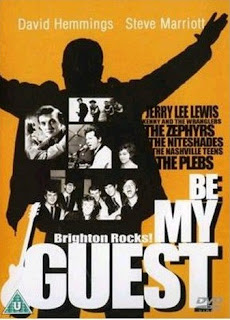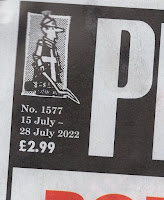The other day I wrote about how
Alan Garner ran up against the limitations of children's holiday fiction. I should also have emphasised that Susan Cooper's attempt to vault over them in Over Sea, Under Stone is not wholly successful.
But maybe that school of writing is more interesting than I made it seem. Certainly, its Ur text, Bevis: The Story of a Boy by Richard Jefferies, is shot through with nature mysticism.
And the landscapes authors choose are often numinous or have come to be accepted as so by readers. My own childhood favourite Malcolm Saville set stories in Sussex and on Romney Marsh, territory already sanctified by Kipling and Russell Thorndike.
He also, as I may have mentioned, set stories in the Shropshire hills where the presiding genius was Mary Webb.
Malcolm Saville knew Church Stretton and the Long Mynd before he started writing his stories, but I once heard his son, the late Revd Jeremy Saville, tell a meeting he was sure Malcolm had not visited the Stiperstones when he wrote Seven White Gates (1944), the first book he set there.
So its distinctive atmosphere came from a reading of Webb's novels, which is why we find Jenny and Peter (Petronella) encountering the Wild Hunt on the Stiperstones during World War II:
Then the atmosphere became cold and clammy as the fog swirled round them. suddenly Jenny gave a stifled little scream and pointed up the track which led to the mines. Shadowy in the thickening mist, the two girls seemed to see a figure on horseback waving ghostly arms but no sound of hooves came to their straining ears. Then far away on the hilltop, it seemed to Peter that tiny, gnome-like figures flitted in uncanny procession.
Jenny turned and wailed into Peter's shoulder.
"Peter. It's true. It's them. They're riding again. What shall we do, Peter? We must hide our eyes. We mustn't even see them. Don't look, Peter."
Saville had another way of making his stories: the dream. His characters (in the three I've remembered off the top of my head all girls) can see the past or the future in dreams.
So, in the opening chapter of The Secret of Grey Walls (1947), Peter, before she had ever met Penny, has a dream that foretells the adventure they and the rest of the children are to share:
Peter began to see the dream country through which she was running. First, she realized that everything around her was cold and grey, but the light was so weird that she could not tell whether it was day or night. ...
She turned her head and, with a sudden shock, saw that she was not alone. A few yards to her left a girl of about her own age was running with her, and as, in her dream, Peter looked at the with curiosity, the girl turned towards her and have her a friendly smile. ...
Then the girl at her side broke the spell by stepping forward a few paces to where they could see, between the trees, a rough cart-track, winding downhill. She clutched Peter's arm and pointed ahead, and suddenly Peter felt that the ugly, grey-walled house squatting in the hollow below them was one of the things for which she had been searching.
Later in the series, in Treasure at Amorys (1964), Penny herself has an extraordinary dream in which she witnesses a Mithraic ritual from Roman times:
The torch-bearers were now lining each side of the central aisle, and although she was surrounded by soldiers somehow she could see the faces of those in white robes who were taking their places between them. But they weren't faces. Not ordinary faces. Their heads were enormous and inhuman. One was beaked like a raven with a great mop of hair, another was a snarling lion and several others, the most frightening of all, were completely blank.
It's no surprise that a Mithraic temple is later found under the grounds of the house where the children are staying.
And late in his career, in one of his less popular series, a Saville heroine had another, less frightening, dream of Roman Britain. Here is Lucy's dream in The Roman Treasure Mystery (1973):
She was alone and not frightened. Happy and at peace. She heard the sound of running water and of a sweet voice singing words that she did not understand. ...
Then, in her dream, she was almost overwhelmed by the desire to hurry through the trees to meet the singer with the silver voice. Now she knew that the singer was a boy and suddenly, with a feeling of indescribable joy she saw him, standing between the trees in a pool of moonlight waiting for her.
A boy of about her own age dressed in a white tunic. His arms and legs were bare and he held his head high as he sang. Then he looked towards her and smiled, and at that moment she was sure that she would never forget the beauty of his face.
So Malcolm Saville could make his stories strange when he wanted, which might just make him the master of the children's holiday adventure I thought him when I was 10.














































